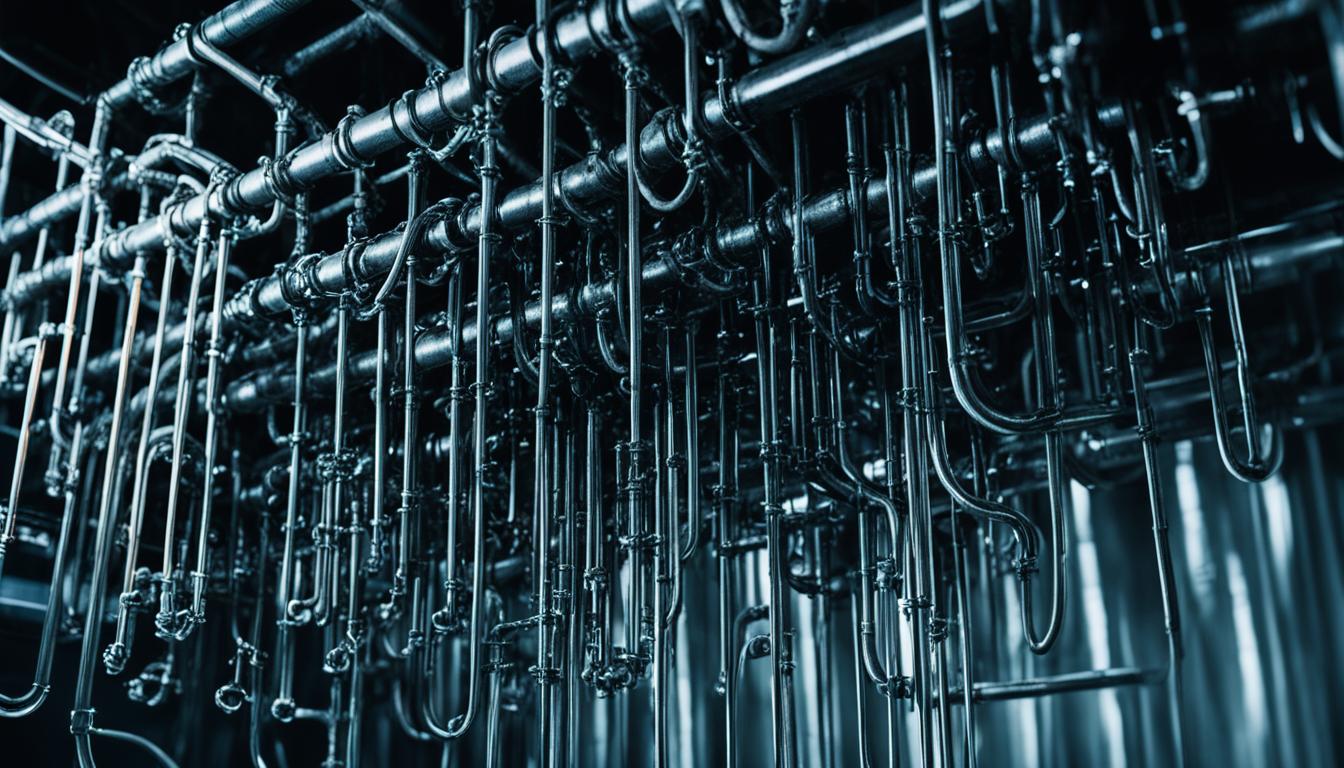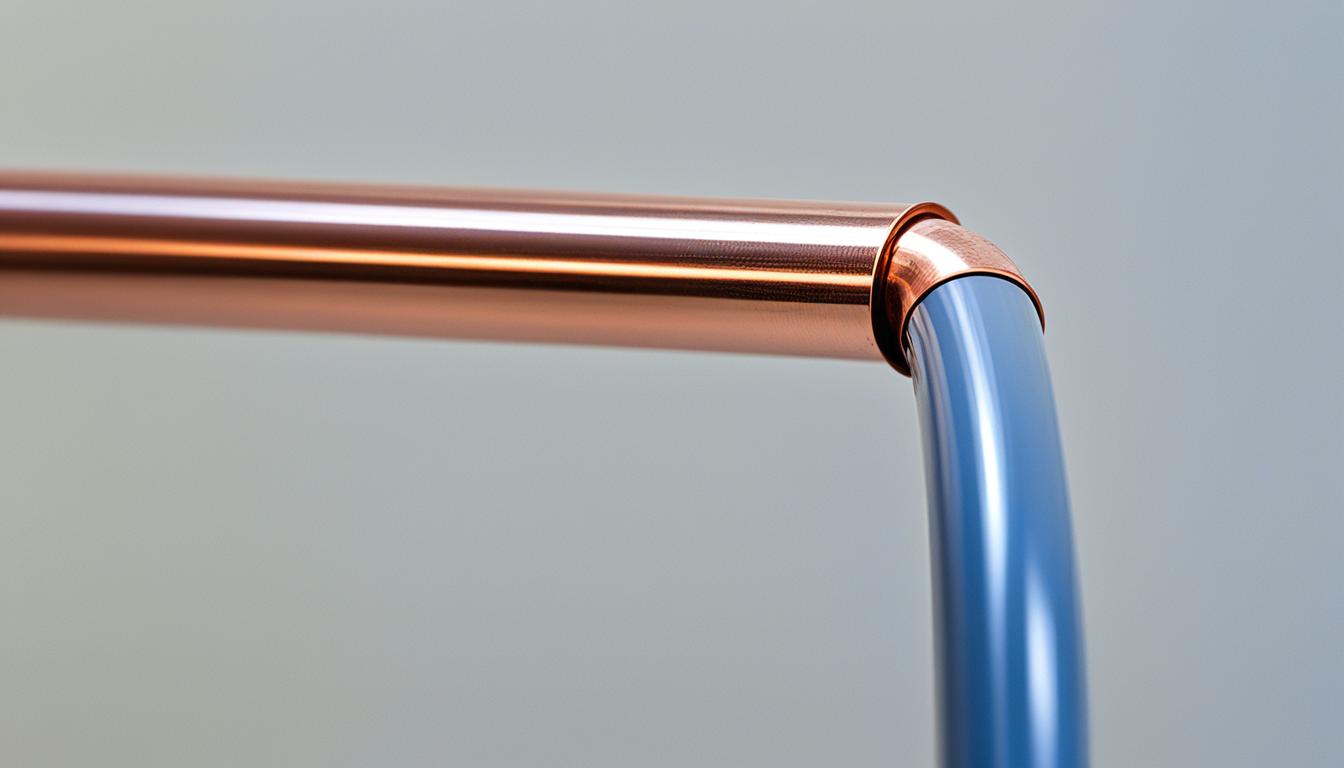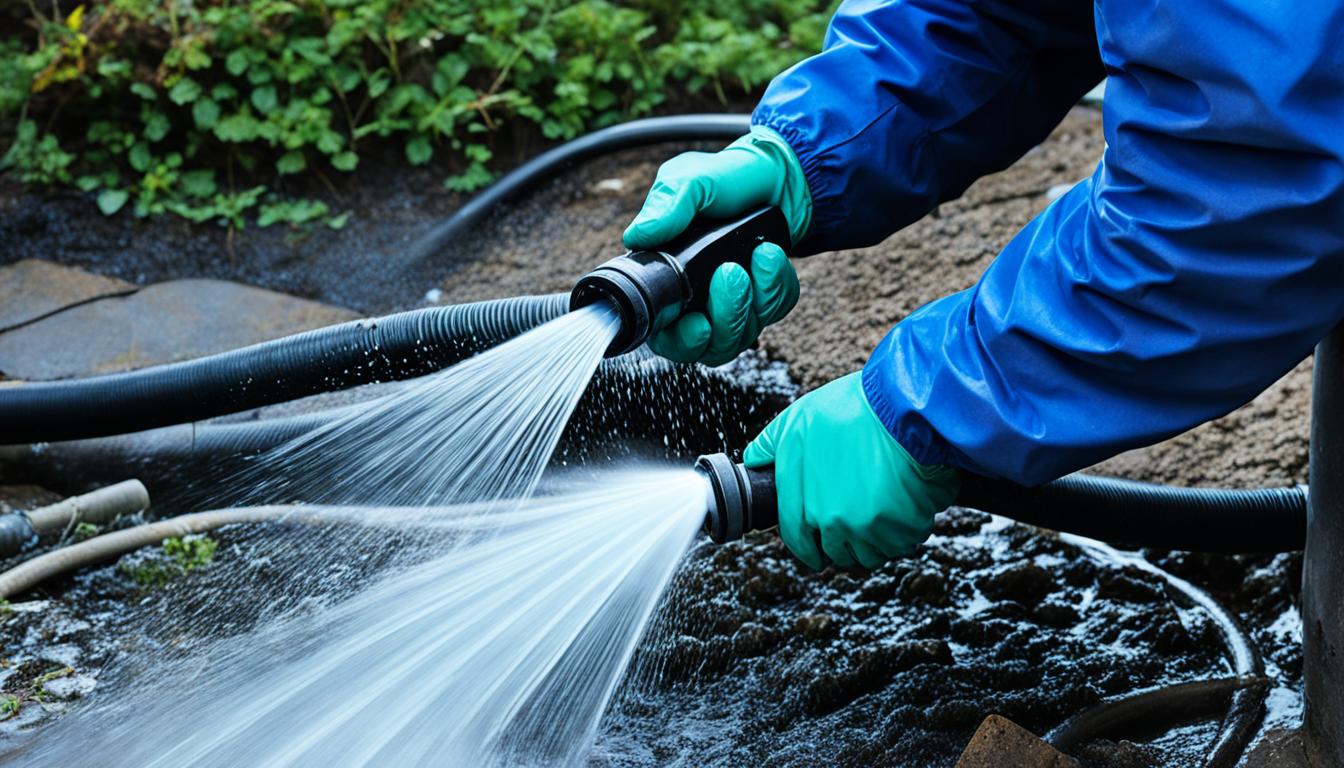Lifespan of PEX Pipes – How Long They Really Last
Did you know that PEX pipes can last up to 50 years or more? That’s right! These durable pipes are a popular choice for water supply systems in residential and commercial buildings. The longevity of PEX pipes depends on various factors, including the quality of the pipe material, proper installation, and water conditions.
Key Takeaways:
- PEX pipes can last up to 50 years or more.
- The lifespan of PEX pipes is influenced by the quality of the pipe material, proper installation, and water conditions.
- PEX pipes are resistant to cracking, breaking, corrosion, and freezing.
- They should not be used outdoors as they are sensitive to UV light.
- PEX pipes offer a cost-effective and long-lasting solution for plumbing systems.
Lifespan Comparison of PEX and Other Types of Pipes
When considering the lifespan of different types of pipes, it’s important to compare PEX pipes with other commonly used materials such as copper, PVC, and cast iron. By evaluating their respective lifespans, we can make informed decisions for our plumbing systems.
Pex Pipes
PEX pipes, known for their durability and flexibility, offer a lifespan comparable to other materials. In most cases, PEX pipes can last up to 50 years or more, making them a reliable choice for both residential and commercial applications.
Copper Pipes
Copper pipes have been widely used in plumbing systems due to their excellent heat and corrosion resistance. These pipes typically have a lifespan of around 50 to 70 years, making copper a durable and long-lasting choice.
PVC Pipes
PVC pipes, made from a synthetic plastic material, are known for their affordability and versatility. Under typical conditions, PVC pipes have a similar lifespan to PEX, lasting up to 100 years. This makes them a durable option for various plumbing applications.
Cast Iron Pipes
Cast iron pipes, commonly used for drain lines, have a reputation for their strength and longevity. These pipes can last around 75 to 100 years, providing a durable solution for wastewater transportation.
While PEX pipes generally offer a lifespan comparable to other materials, it’s important to consider other factors such as water conditions and proper installation. Consult with a professional plumber to determine the most suitable choice for your plumbing needs.
| Pipe Material | Lifespan |
|---|---|
| PEX | Up to 50 years or more |
| Copper | 50 to 70 years |
| PVC | Up to 100 years |
| Cast Iron | 75 to 100 years |
Factors Affecting the Longevity of PEX Pipes
The lifespan of PEX pipes can be influenced by several key factors. It is important to consider the quality of the PEX pipe material, the proper installation techniques, and the water conditions in order to maximize the longevity of these pipes.
The quality of the PEX pipe material is a crucial factor in determining its durability and lifespan. Higher quality PEX pipes are made from premium materials that offer superior strength and resistance to wear and tear. Investing in high-quality PEX pipes ensures that your plumbing system will have long-lasting and reliable performance.
Proper installation is another critical factor in maintaining the longevity of PEX pipes. Incorrect installation techniques such as kinking, pinching, or crimping can damage the pipes and reduce their lifespan. It is highly recommended to hire a professional plumber who has expertise in PEX pipe installation to ensure that the pipes are properly installed and free from any potential damage.
The water conditions also play a significant role in the longevity of PEX pipes. High levels of acidity or chlorine in the water can degrade the pipe material over time, leading to a shorter lifespan. It is advisable to have a water test conducted to assess the quality of your water supply and identify any potential corrosive elements that can affect the durability of PEX pipes.
By considering these factors and taking appropriate measures, such as investing in high-quality PEX pipe material, ensuring proper installation techniques, and monitoring water conditions, you can maximize the lifespan of your PEX pipes and enjoy a reliable and durable plumbing system for years to come.
| Factors | Impact on Longevity of PEX Pipes |
|---|---|
| Quality of PEX Pipe Material | Influences durability and lifespan |
| Proper Installation | Avoids damage and extends lifespan |
| Water Conditions | Can corrode pipes and reduce lifespan |
Advantages and Disadvantages of PEX Pipes
When it comes to choosing the right plumbing material for your system, PEX pipes offer several advantages that make them a popular choice. Let’s take a closer look at the pros and cons of PEX pipes compared to traditional copper pipes.
Pros of PEX Pipes
- Lower Cost: One of the major advantages of PEX pipes is their affordability. PEX pipes are generally less expensive than copper pipes, making them a cost-effective option for homeowners.
- Ease of Installation: PEX pipes are easy to work with and install. They are flexible, allowing for easier maneuverability and fewer connection points, which reduces the potential for leaks.
- Resistance to Corrosion and Freezing: Unlike copper pipes, PEX pipes are resistant to corrosion and freezing. This makes them a durable choice that can withstand harsh conditions without deteriorating over time.
- Reduced Potential for Leaks: With fewer joints, PEX pipes have a reduced potential for leaks, providing homeowners with peace of mind and lower maintenance costs.
- Drinking Water Safe: PEX pipes are safe for carrying drinking water. They are made from materials that meet strict industry standards and regulations for plumbing systems.
- Resistance to Rodent Attacks: PEX pipes can be more resistant to rodent attacks compared to other plumbing materials. This can help prevent costly damage to your plumbing system.
Cons of PEX Pipes
- Sensitivity to UV Light: PEX pipes should not be used outside or exposed to direct sunlight. The material is sensitive to UV light and can degrade over time when exposed to the sun’s rays.
- Not Suitable for Highly Acidic Water: PEX pipes may not be suitable for areas with highly acidic water. The acidity can potentially degrade the pipes and impact their longevity.
It’s important to consider the advantages and disadvantages of PEX pipes when making a decision for your plumbing system. While PEX pipes have many benefits, copper pipes offer a longer lifespan and are better suited for certain applications. Consulting with a professional plumber can help you weigh the pros and cons and make an informed choice that meets your specific needs.
Installation and Maintenance of PEX Pipes
Proper installation is crucial for maximizing the lifespan of PEX pipes. When it comes to installing PEX pipes, it is highly recommended to enlist the services of a professional plumber with experience working specifically with PEX pipes. An experienced plumber will ensure that the proper installation techniques are followed, minimizing the risk of future issues.
One of the advantages of PEX pipes is that they require fewer connections compared to copper pipes. This reduction in connections significantly reduces the chances of leaks occurring. By minimizing the number of joints, you can enhance the overall integrity of your plumbing system and enjoy its long-term reliability.
Maintaining your PEX pipes is equally important for their longevity. Regular maintenance practices, such as periodically flushing the pipes to remove mineral deposits, can help maintain their efficiency and prevent potential clogs. Consulting with a professional plumber for any repairs or maintenance needs is highly recommended to ensure the longevity of your PEX pipes in your plumbing system. By taking these steps, you can ensure that your PEX pipes continue to serve you well for many years to come.
Source Links
- https://www.ezflowplumbingaz.com/blog/2020/december/how-long-plumbing-systems-and-fixtures-typically/
- https://333help.com/blog/how-long-will-pex-piping-last/
- https://www.bobvila.com/articles/pex-vs-copper/
- Investing Wisely: How Windows & Doors in Boost Property Value and Financial Health - April 24, 2025
- The Financial Impact of Personal Injuries: Why Legal Help Matters for Business Owners - April 16, 2025
- The Hidden Financial Costs of Domestic Assault: What Business Owners Need to Know - April 16, 2025













